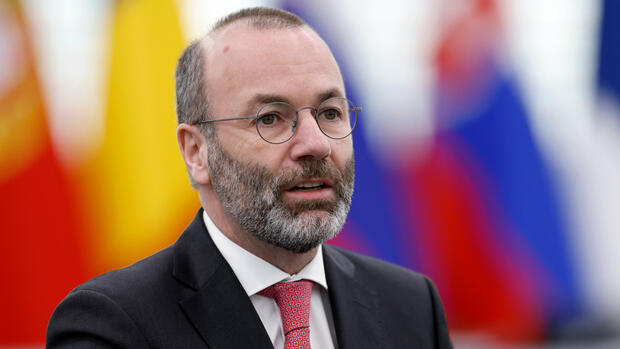The head of the European People’s Party (EPP) had been stirring up sentiment against the nature conservation law for months because, in his view, it unilaterally burdened farmers with the costs of climate protection.
(Photo: AP)
Brussels The uprising of the European conservatives against the nature protection law has failed. On Wednesday in Strasbourg, 336 MEPs voted in favor of the EU Commission’s draft law, while 300 voted against.
The result is above all a defeat for Manfred Weber (CSU). The head of the European People’s Party (EPP) had been stirring up opposition to the law for months because, in his view, it unilaterally burdened farmers with the costs of climate protection.
He also wanted to send a signal against the supposedly escalating EU bureaucracy – and send a warning to his party colleague, Commission President Ursula von der Leyen (CDU).
In recent weeks, Weber has managed to get the law rejected by the Agriculture and Fisheries Committees. There was a stalemate in the Environment Committee. The vote in the plenum was therefore eagerly awaited.
The narrow majority on Wednesday underlines once again how controversial the law is. From Germany, in addition to the CDU and CSU, the representatives of the FDP and AfD also voted against. However, not even all EPP MEPs wanted to follow their leader Weber and voted for the draft.
Rivers, moors and forests are to be restored
The Greens were relieved. The law is good for the climate, for biodiversity and for farmers, said MP Jutta Paulus. Weber damaged the reputation of Parliament with his “destructive intrigues”. The rapporteur of the EPP group, Christine Schneider (CDU), spoke of a “bad decision”.
In Berlin, Federal Environment Minister Steffi Lemke said the current heat wave with parched fields, forests and rivers is proof of “how urgently we need this law.”
The “Green Deal” is the central project of the Von der Leyen Commission. It consists of dozens of climate protection laws designed to ensure that the EU becomes carbon neutral by 2050. Forest areas are also to be reforested as part of the project.
(Photo: dpa)
With the draft, the EU is planning for the first time not only to protect nature, but also to actively restore it. 80 percent of protected habitats are in poor condition. This accelerates species extinction and climate change. To counteract this, the commission recommends watering drained moors, reforesting forests and greening cities.
In concrete terms, renaturation is to begin on at least 20 percent of the surfaces and sea areas in the EU by 2030. 25,000 kilometers of river are to be restored to their natural state. The member states decide for themselves how to achieve the requirements.
EU Environment Commissioner Virginijus Sinkevicious said in a final appeal to MEPs on Tuesday that the success of the entire “Green Deal” would depend on the Nature Restoration Act. Climate activist Greta Thunberg also traveled to Strasbourg to remind parliamentarians of their responsibilities.
Weber squints at the successes of the right-wing populists
The “Green Deal” is the central project of the Von der Leyen Commission. It consists of dozens of climate protection laws designed to ensure that the EU becomes carbon neutral by 2050. The European Parliament has supported the “Green Deal” since 2019 with a broad alliance of Christian Democrats, Social Democrats, Liberals, Greens and Leftists. Weber’s EPP approved 32 out of 34 bills.
Parliament narrowly voted in favor of the Nature Conservation Act.
(Photo: dpa)
Most recently, however, the EPP had veered away from the ban on combustion engines and renaturation. With a view to the European elections in June 2024, Weber is now calling for a regulatory break in Brussels.
In addition, with the nature conservation law, farmers are a core clientele of his party. Agricultural associations warn that yields will fall and farms will have to close if arable land is converted to meadows and forests. Weber says you shouldn’t ignore these concerns. When the law was debated in parliament on Tuesday, the EPP leader posed outside with protesting farmers.
Greens and Social Democrats see Weber’s swing as a pure campaign maneuver. In fact, the camps in the European Parliament seem to be rearranging themselves. Weber follows the rise of right-wing populists in Europe very closely.
Giorgia Meloni’s victory in Italy and the success of the Dutch farmers’ movement made a lasting impression on him. He expects that the right-wing parties will have even more weight in Parliament after the European elections. Accordingly, he wants to keep all options open. According to Weber, anyone who supports the EU, Ukraine and the rule of law is acceptable as an alliance partner.
Now that there is a parliamentary position on the nature conservation law, the trilogue negotiations with the EU Commission and the member states can begin. Vice-Commissioner Frans Timmermans hopes to implement the law in this legislative period.
More: Researchers see no climate neutrality without removing CO2 from the air
